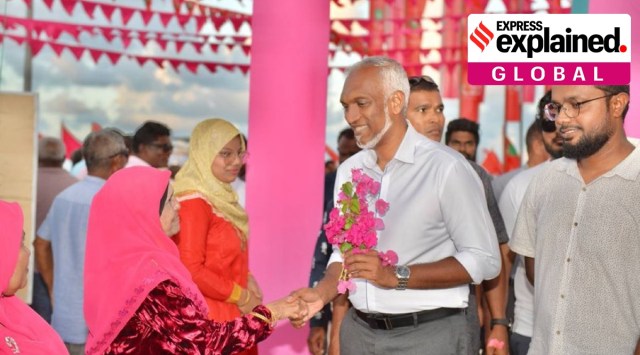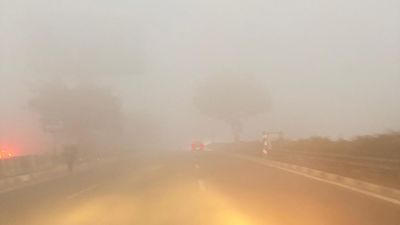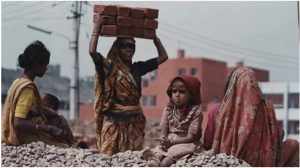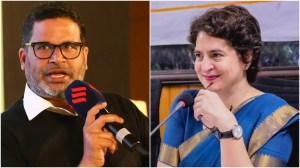Under President-Elect Mohamed Muizzu, the path forward in India-Maldives ties
In the run-up to the elections, Muizzu’s coalition had taken a strong position against India's influence in the Maldives. Post his win, he has toned down the rhetoric somewhat. Here are the sticking points in the India-Maldives relationship.
 Muizzu's pro-China tilt has raised concerns in India. (Photo: X/@MMuizzu)
Muizzu's pro-China tilt has raised concerns in India. (Photo: X/@MMuizzu) In one of the first statements following his victory in the country’s presidential elections, Maldives’ new president-elect Mohamed Muizzu, said “We will send back foreign soldiers in the Maldives.” While Muizzu did not name any country, his remarks have been interpreted as a message directed at India.
Muizzu’s People’s National Congress-Progressive Party of Maldives (PNC-PPM) coalition had heavily focused on India’s influence in the archipelagic nation and had accused New Delhi of using this influence to establish what it called a permanent military presence in the Maldives.
Following the results, there has been intense focus on what Muizzu’s win means for Maldives-India relations, as well as the country’s foreign policy.
The background
There have been a handful of issues—some over a decade old—that have been particularly in focus in the context of bilateral relations between India and the Maldives, particularly in the run-up to this year’s presidential elections.
The first is the long-standing controversy over the two Dhruv Advanced Light Helicopters (ALF), based in Addu Atoll and at Hanimaadhoo, that were given by India to the Maldives in 2010 and in 2015, both of which were used for maritime weather surveillance, ocean search-and-rescue operations and for airlifting patients between islands.
Observers who have monitored India-Maldives relations told indiaexpress.com, that while these helicopters were for humanitarian purposes only, supporters of the anti-India campaign, particularly the PPM, were trying to portray that by gifting these military helicopters, India was attempting to create military presence in the country.
According to the terms of bilateral agreements between the two countries, Indian officers had been sent to the Maldives to train the Maldives National Defence Force, under whose command these helicopters operate.
In 2016, during the Yameen government, domestic fervour against the perceived military presence of Indian forces in the country reached its peak, with the Maldives asking India to take back these helicopters and refused to extend the term of the agreement that would extend their stay and use in the country. Supporters of the ‘India Out’ campaign told indianexpress.com that the campaign was rooted in this controversy surrounding the ALF choppers and India’s reported refusal to take them back.
Several bilateral agreements between India and the Maldives involve training provided by Indian soldiers to their Maldivian counterparts, including in the agreements concerning the helicopters.
Two years later, in 2018 when Ibrahim Mohamed Solih assumed office, he resigned these agreements, extending the stay and use of these helicopters in the country.
Another recurring complaint by supporters of the ‘India Out’ campaign has been the lack of transparency in agreements being signed between the Solih government and India, where these bilateral agreements have not been shared and discussed in the Maldives Parliament, citing national security.
Ongoing developments
Muizzu’s statements saying that his government will remove foreign soldiers should not come as a surprise, says Dr. Gulbin Sultana, a research analyst at the Manohar Parrikar Institute for Defence Studies and Analyses, whose area of research includes the Maldives. “It was one of the main issues in the election campaign so they have to show their voters that they are trying to fulfil their election pledges,” says Sultana.
But while politicians have the freedom to pursue volatile rhetoric while campaigning before elections, that is much harder to do as the leader of a nation. Sultana points to the Yameen government’s cancellation of bilateral agreements with India, a move that had aligned with both the former leader’s rhetoric and foreign policy. Steps such as aggressively cancelling agreements, would require the Maldives to cough up financial compensation of an amount running up to millions of dollars, which it may not necessarily be in a position to undertake.
In a report published in 2022, the World Bank has said that although the Maldives was not at immediate risk of a crisis, the country needs to raise revenues and implement several expenditure and debt reforms to avoid an economic crisis in the future.
Observers in India believe that even if under the leadership of Muizzu, the Maldives takes a step back to review agreements that the Solih government had signed with New Delhi, the country will be compelled to turn to other allies for assistance to fill the subsequent gap.
Even before Muizzu won the presidential elections, social media and some sections of the press in India began focusing heavily on what his win would mean for India, given that the People’s National Congress-Progressive Party of Maldives (PNC-PPM) coalition had openly supported the ‘India Out’ campaign.
There were questions whether concern regarding Muizzu’s pro-China tilt in addition to the ‘India Out’ campaign were exaggerated and unwarranted. “The relationship between the Maldives and India is self-standing and should not be contingent upon the leadership of our respective nations or the relationships both our countries maintain with other nations. The relationship we have with India is time immemorial, and the main foundation of the relationship is based on people to people contact that is both civilizational and traditional in nature. While we may at times read signals wrongly, the relationship is much stronger than we probably imagine. Having said that, we must also be mindful of the fact that the noise during the election campaign existed for a reason,” says Ahmed Mohamed, former Ambassador of the Maldives to India.
Analysts who have monitored bilateral relations between the two countries for years, agree that much of the criticism levelled by the Maldivian opposition in the run-up to the presidential elections and the ‘India Out’ campaign wouldn’t have arisen had the Solih government done more to address the concerns and complaints within the country’s political circles as well as among people who were spearheading these campaigns.
“Like any other nation, we cherish our sovereignty and do not wish to be subjugated or controlled by another country. The mandate bestowed upon the incoming leadership is crystal clear – it is to protect our sovereignty and ensure we are not subject to external dominance. Whether the fear and concern are exaggerated or unwarranted depends on several factors, including the nature and objectives of the various agreements concluded between our two countries during the past five years and how both countries wish to navigate their diplomatic relationship moving forward,” says Mohamed.
From the perspective of the Maldives, one way to achieve this and perhaps hit a reset on bilateral relations would be for both countries to “clear and open communication channels” to “address any misunderstandings and ensure that the actual impact on Maldives-India relations is based on concrete actions rather than speculative narratives. Vigilance and constructive engagement remain key in assessing the situation,” he adds.
The focus on and the tensions concerning India in the months leading up to the elections had a lot to do with the naming of the campaign ‘India Out’. In 2021, when indianexpress.com first reported on this movement, Shifxan Ahmed, co-founder of Dhiyares, that has been at the forefront of the campaign had said in an interview, “We are just protesting military presence in the country. We are not calling for a violent clash against India or Indians in Maldives”.
Experts interviewed in the Maldives and India have said that while the campaign has claimed it is protesting against Indian military presence, naming the campaign ‘India Out’ was interpreted as singling out and targeting the country, which had a butterfly effect, impacting all aspects of exchanges between the two countries.
The anti-India sentiment didn’t just sprout overnight last year, but is nearly a decade old and can be traced back to when Abdulla Yameen Abdul Gayoom of the Progressive Party (PPM) became president in 2013. Bilateral relations between the countries makes for complex analysis, particularly in the present political climate.
Underlying sentiments
During Yameen’s rule, India-Maldives relations severely deteriorated and the anti-India sentiment was apparent even back then, researchers say. There was a significant amount of anti-India rhetoric during that time because the Maldivian government was pro-China, but at the same time, it had also openly discussed an ‘India-First’ policy for the Maldives.
While some analysts in India have picked up murmurs among vocal, influential campaigners of the ‘India Out’ movement that the Maldives under Muizzu may attempt to keep India at a distance, if not engage in an open boycott, others have said that such extreme steps would be unlikely between the two countries.
“The size and strategic location of India within the Indian Ocean region undeniably bestow upon it a significant role in shaping security dynamics. In the context of cross-border and regional security as well as geopolitics, it’s essential to recognize that cooperation and engagement among countries in the region are typically more effective than exclusion or boycott. The interconnected nature of today’s global challenges necessitates collaborative efforts. Hence, fostering dialogue, promoting trust, and working together with India and other bilateral and multilateral partners will definitely lead to more stable and secure regional dynamics,” says Mohamed.
Observers believe that the results of the elections in the Maldives have much to do with the way matters were handled domestically by the Solih government as well. Experts interviewed for this report in the Maldives who requested anonymity citing the sensitivity of the situation said, since 2018, particularly after the start of the India Out campaign, Indian diplomats station in the Maldives have not been able to develop constructive relationships with politicians outside the ruling MDP party, which led to perhaps strained relations and sparse communication with parties like PPM, PNC etc.
“While some may perceive strained relations and sparse communication with certain political parties, it’s essential to consider that diplomatic engagement is a complex process influenced by a range of factors. The warm reception of ordinary Maldivians towards Indians underscores the significance of people-to-people connections and the potential for positive relations to transcend political discourse,” says Mohamed.
All of this came together and contributed to fuelling anti-India sentiments, misunderstandings and the building of a sense of mistrust. While many ordinary Maldivian nationals believe that Indian citizens are very much welcome in the country, the lack of political dialogue has given a different impression.
“The sentiments of everyday citizens can often diverge from political narratives. However, we should not underestimate the significance of the India-Out campaign, as it represents a clear mandate given by the people to the incoming new administration to review the existing engagement between Maldives and India particularly related to foreign military presence in the Maldives,” he adds.
“Some voices in India have said that the India factor was the only reason for Solih’s loss but I don’t think so. It was a major issue towards the end of the first round of elections, when most of the political parties were talking about the ‘India Out’ movement. They weren’t using such hard words that India should be ‘out’, but they were saying that India’s influence should be reduced,” says Sultana. A lot of it has to do with the disinformation and misinformation that was spread during the campaigning, something that the European Union Election Observation Mission also noted following the elections.
Analysts believe that the results of the first round of elections forced the Solih administration to accept that his government did little to counter the wave of misinformation, particularly concerning India, that preceded the elections.
Path forward
Following his win, Miuzzu has toned down his rhetoric towards India, and in his first public speech Muizzu promised to fulfil his campaign pledges, especially his intention to “remove foreign soldiers from the Maldives within the constraints of law”. “He had said Solih didn’t reveal those agreements, but now he has also said that he will do whatever he can based on what the laws allow. Some clauses in agreements cannot be revealed based on national security, and even he has probably realised that,” says Sultana.
Three days after the election results came in, Muizzu met with the Indian high commissioner Munu Mahawar in a courtesy call, during which a letter of congratulations from the Indian Prime Minister Narendra Modi was handed over to the president-elect. The Progressive Party of Maldives tweeted that Muizzu, along with vice president-elect Hussain Mohamed Latheef, had discussions with the Indian high commissioner on “further enhancing bilateral relations between Maldives and India”.
Pleasure to call on President-elect H.E.@MMuizzu & Vice President-elect H.E @HucenSembe
Handed over a congratulatory message from Prime Minister Shri @narendramodi.
Look forward to building on our productive discussions to further enhance India – Maldives relationship. https://t.co/gk2p56f3en
— Amb Munu Mahawar (@AmbMunu) October 4, 2023
“Chinese investment and economic cooperation will increase from what it was during the Solih administration, but as far as India-Maldives relations are concerned, I don’t think it will go back to what it was during the Yameen government in 2013-2018. That was the worst period for India-Maldives bilateral relations,” says Sultana.
- 01
- 02
- 03
- 04
- 05






































